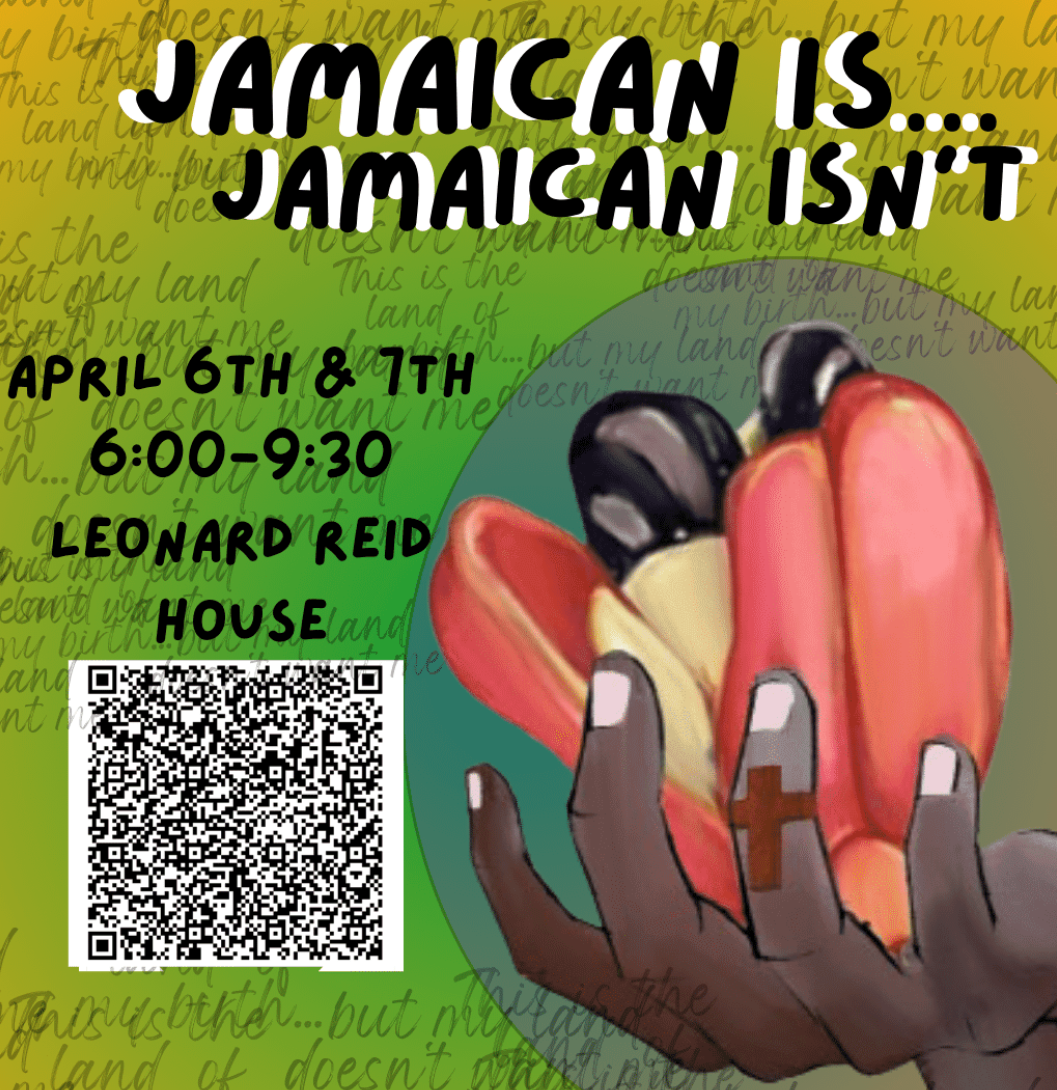“Jamaican is… Jamaican isn’t” is a multimedia exhibition curated by student Aurelie Campbell as a part of their thesis, “Jamaican is… Jamaican isn’t: Exploring LGBTQIA+ Oral History Narratives of the Jamaican Diaspora through Oral Performance, Dance and Music.” Attendees can view portraits taken of the participants, listen to their recorded oral histories and watch a performance meant to embody these histories through monologues, singing and dance.
Sponsored by the Sarasota African American Cultural Coalition (SAACC) and funded by the Student Research and Travel Grant fund (SRTG), Campbell’s thesis performance is scheduled for April 6 and 7 at the Historic Leonard Reid House in Newtown. Campbell told the Catalyst they originally heard of the landmark through their Student Reporter position at WSLR during their first year at New College.
Campbell recalled taking Professor of Sociology Queen Zabriskie’s “Cultural Politics in the African Diaspora” course. “We’re talking about ways that, particularly people that look like me, my ancestors, survived. [It] has been through these generational things, whether it’s songs or dancing. That class was a lot about oral history and oral performance and kind of how we survive despite racist systems continuing to thrive to some extent.”
Through the class, Campbell met J. Carl DeVine, a prominent HIV/AIDS activist from Tampa, who sparked Campbell’s idea for how to move forward with their thesis. “Getting to know him and his story, also thinking about my literature review, reading a lot about how, in a lot of ways, queer people, our destinies are telling the stories that have been silenced. Especially Black women, just talking about ideas of the ways that we haven’t been able to be ourselves in places. That’s kind of how I came here, to this idea.”
Campbell moved forward in the thesis process by collecting the oral histories of Jamaicans who sought asylum in the United States and Jamaican Americans, specifically looking at the ways they came out as LGBTQ+ and how they came to find a sense of belonging. Along with collecting oral histories, Campbell used oral performance as a way to embody the participants’ stories through dance and spoken word during their time away from New College in New York City.
“While I was away, I was reading about oral history but I was also taking West African dance classes, getting to be a part of Black queer communities and dancing communities,” Campbell recalled. “I realized that dancing was bringing me joy in a way that I haven’t felt in a long time. So in some ways this thesis transformed with me because it was just supposed to be oral histories. But then getting to be a part of West African dance classes and meeting more Black queer artists who are my age, who are making art and showing the vulnerabilities that life has and creating their own spaces… Something about this is also about the stories I’ve collected and in what ways can I highlight them in a different way.”
Campbell identified E. Patrick Johnson as another inspiration in their thesis, having read about him in Zabriskie’s class and later meeting him last year. “Johnson essentially collected oral histories of gay Black men in the South and how they live. They put on their own show, an oral performance, embodying those characters. I actually got to meet him when I was away and he was intrigued about me doing something about Jamaican LGBTQ+ status and what that means and translates to.”
In conjunction with reading academic articles and collecting oral histories, Campbell led their own tutorial titled, “Jamaican is… Jamaican isn’t: Multimedia exhibition,” under the sponsorship of Professor of Theater, Dance and Performance Studies Leymis Wilmott. Campbell and the tutorial students arranged to showcase their coursework at the Leonard Reid House. They have met on Mondays, Wednesdays and Fridays this semester to work on the performance and to learn more about embodying stories through different dance genres.
“When we’re in class, we do predominantly West African-style dances,” Campbell stated. “It’s been great because it’s just one space to facilitate. It actually brings up my vibrational levels in the morning because I think [with] West African dance you have to get very hyped.”
While the thesis process is typically met with anxiety and stress, Campbell left the Catalyst with a piece of advice: to thrive through the thesis process, not just survive. In many ways, Campbell has had the ability to learn more about themselves, their family and their identities throughout the research, data collection and performance work. Ultimately, the stories and narratives they collected amounted to important findings on the sense of belonging.
“When we’re talking about oral performance, West African dance, these were tools we know our ancestors used to survive colonial power and oppression,” Campbell said. “I think when bringing it into perspective, especially in the political climate that is Florida… How do we, especially as people of color, think about where we are coming from and not just, we go into spaces and we don’t belong. How do we go into spaces and [say], ‘Yeah, I kind of do belong no matter what you think of me.’
“I think about why oral history or oral performance is important,” Campbell continued. “It’s because not everybody is going to read the text, not everybody is going to understand the text. So taking the fine print and bringing it to life, in a lot of ways these stories are already in life, but they’re often silenced stories.”

